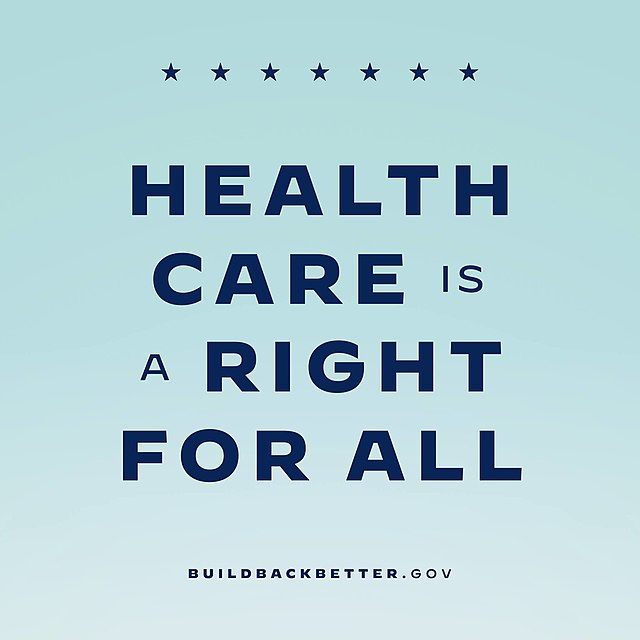Much of the current debate surrounding health care – putting aside momentarily the catastrophic failure of the public health system during the pandemic – is whether or not it is a “right” or a “privilege.”
Critically, though, what should be a key component of the discussion is utterly ignored: should it be thought of as an evolutionary advantage, a biological imperative that would remove it from such a discussion?
Crucially, the right or privilege debate is itself invalid. Health care is neither and the back and forth over the issue in fact damages any attempts at reform because it creates a false dichotomy and a political distraction.
The definitions are crucial to understanding the issue. First, what is health care? Is it cradle to grave, any and everything you could possibly need or want whenever you need or want it with no other considerations save a person’s self-defined wellness, comfort, and care?
Or is it more basic – get hit by a bus and get your leg fixed; pretty much everything else you’re on your own?
Or something in between?
What is a right? Health care cannot legitimately be seen as a right like free speech because that right does not inherently entail physicality and/or cost. In fact, health care does not even remotely qualify as a right, as the term right has been used for the past 300 years.
Those who demand it be seen as a right currently are manipulating – purposefully – both the meaning of right and of health care. The argument of it being a right is in fact an argument calling for it to be free – no more, no less – and free stuff is not a right, especially when said benefit is stripped of any concomitant responsibility that all actual civic rights come with.

To be blunt, no one has the right to make a person pay for their neighbor’s chiropractor, particularly when they are not allowed to tell the neighbor to stop lifting 400-pound boxes for fun every day.
There is also the matter of the societal aspects of health care, thereby extending those putative rights and adding restrictions and laws and rules and caveats along the way. This already extant effort to move health care from a right to an all-encompassing construct that should have primacy in society has begun; not just a health care right but health care justice, health care equity, as it were.
Major parts of the existing health care system – particularly its political manipulators – are moving in this direction; under the cover of improving health outcomes for all while actually merely expanding their power base and influence over society, foundations and government agencies are elasticizing the meaning to include nearly every aspect of daily existence.
For example, The California Endowment was created (by state fiat) to improve access to health care insurance.
Now, the multi-billion dollar foundation spends the vast majority of its budget (beyond the exorbitant salaries and such) on advocacy, outreach media, community capacity building, get out the vote education efforts, etc. And it says it can legally (nonprofits are governed by certain rules meant to limit political activity) do that because it has redefined health care to mean what it wants to mean: “(H)ealth is not just health care, it is shown through research and other health experts that the place where you live, work, go to school, play, etc. can have both negative and positive impact on your health.”
This is nonsense as it is a definition without limits and it has no relevance except to allow power grifters to expand their influence ad infinitum.
Is health care a privilege? Again, it depends upon the meaning of privilege.
Until quite recently, privileges (except for third-generation rich kids blowing through the family fortune) were often seen as things that were earned. Getting good grades? You don’t have to go to the proctored study hall. “Membership has its Privileges,” said American Express.
Currently, though, the idea of privilege entirely involves unearned privileges. It involves being white, a guy, straight, smarter, better looking, being lucky , etc. and hard work or having a good idea or anything that would imply it can be earned though individual effort is deemed wrong (and racist and an example of systematic injustice and whatever.)
Privilege is a bad word, an insult, a jealous denigration of another person and tagging health care with the epithet is done to publicly deem in any way fettered access to it as inherently unfair.
Privilege no longer implies extra effort – it’s just another word for luck (typically at the expense of another).
Earned or not, all privilege is currently seen as evil, making those who have access to good health care similarly awful, uncaring greedy people.
Therefore, the term privilege is irrelevant to the discussion as it says nothing about health care itself.
Health care is – for most – something a person must pay for and, therefore, not a privilege, under any definition.
If there is an aspect of privilege in health care it is, in part, being defined as having really good health care, or an inequitable ability to access the best care available and that is tagged as a privilege because not everyone has the same thing. But having bought something better is not a privilege; it’s just the result of being able to buy something better than most.
Remember: one of the most compelling arguments for ObamaCare was in fact a sub-conscious argument: you can vote yourself immortal just like rich, putatively privileged, people. This played into the idea of health care being a right because the government deemed it so which, no matter the political taking credit bloviating, it actually did not.

So health care is not a right, unless you use that word to mean “free,” and it is not a privilege – so what is it?
Is it a free market service, like buying a new shirt at the store?
Absolutely not because of the inherent ethical issue. While the right to health care does not exist, a societal ethical imperative to care for others most certainly does. A hospital will not – cannot – turn away a bus crash victim. The work to save the person gets done, no matter what.
This ages-old practice ripples the perception pond, separating health care from other things people pay for. A car will not be provided to you, for example, just because you really really need one.
Therefore, health care can still not be considered a right but can be seen as a moral munificence “rightfully” bestowed by society and, therefore, it is up to society to decide how far to extend this munificence. Should it be what used to be called “major medical” or should it include weekly trips to the acupuncturist, too? In other words, is “equitable” government-based health care more of an enforced charity than a health care system?
It is this grey area that further impedes efforts to discuss the issue rationally and calmly, because such discussions can always be ended by someone yelling “You want my gam gam to die of cancer, don’t you!?!?”
All of this brings us back to a third option, the idea of health care as an evolutionary imperative.
The theory of evolution involves random mutations, environmental factors, and such but it also involves adaptation, or the selection of certain strengths to continue to enhance.
For example, having sickle cells is now a bad thing; when African bodies evolved them as a method to grant a certain amount of immunity to malaria it was, from a net life-expectancy standpoint, a very good thing.
Can health care be seen as an extra-physical evolutionary advantage? A person with better health care tends to live longer than one without – that is a given. And there is (current gender-related discussions aside) an evolutionary need to pass along as many healthy genes as possible to extend your genetic line.
Therefore, isn’t having proper health care neither a right nor a privilege but a legitimate earned biological reproductive advantage that should be seen just as that with no moral judgments attached (especially as societal moral judgements change with the wind?)
This is not “survival of the fittest”– this is an individual taking advantage of self-created and environmental factors to extend the life of his or her genetic material in a fashion that does not negatively impact others; hence it not being “social Darwinism.”
One person having better health care does not mean another person automatically has worse health care; it just means they will have an advantage – earned in this case, and possibly even temporary – in the eternal evolutionary battle.
So health care should be seen neither as a right nor as a privilege, but merely as a tool to which some people have created better access to.
In other words, the debate between right or privilege is, again, dangerously meaningless.
While this concept does not solve the health care system’s litany of dyspeptic problems, it could help with modifying the lens through which we look at health care to allow for different reform approaches.
It could also ratchet down the intensity of the politics surrounding the issue. Any modification to the current system – save to make it give more stuff away for free – is angrily shouted down with horrific, often hypothetical, potentialities.
Ironically, in nations with state-run health care systems there is, for cost and capacity reasons, the kind of selective rationing that the “It’s a right!” people rail against occurs quite frequently. It is especially ironic considering they tend to support government health care, for in nations that have state health care but still allow a parallel private system to exist, the idea of it being a “privilege” is a little more difficult to dismiss, especially considering that in places like Britain having private health care is in fact a status symbol.
By emphasizing the fact that health care in America is not a zero-sum game – that one person having different access to health care does not lessen the access another person has – some of the vitriol can be removed from the discussion.
And by dismissing the “right or privilege?” false dichotomy out of hand from the outset of any reform discussion, the actual facts become clearer and more manageable.
And that cannot be unfair.
Republished from the author’s Substack
Published under a Creative Commons Attribution 4.0 International License
For reprints, please set the canonical link back to the original Brownstone Institute Article and Author.









